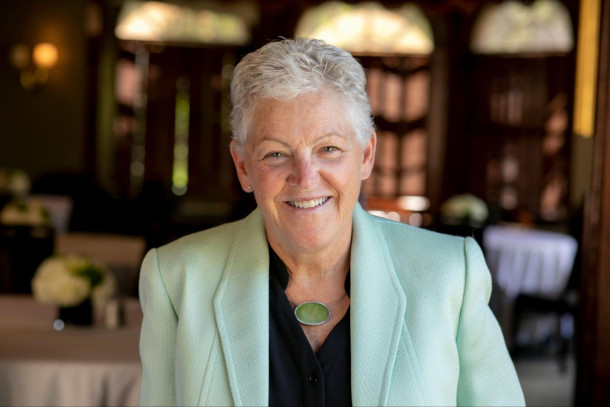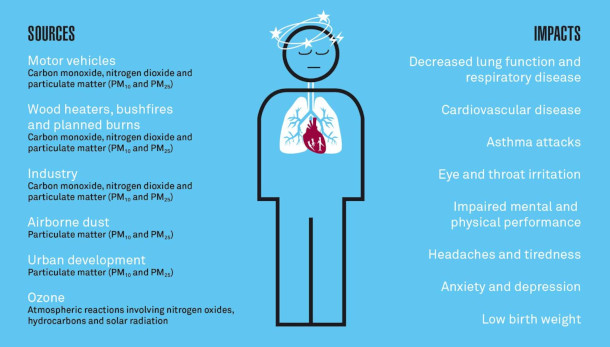Gina McCarthy on Particulates
Air Date: Week of March 1, 2024

Gina McCarthy was the Administrator for the Environmental Protection Agency from 2013-2017 and the first White House National Climate Advisor from 2021-2022. She is now the Managing Co-Chair of America Is All In. (Photo: Harvard University)
The U.S. Environmental Protection Agency has announced new measures to reduce the allowable amount of fine particulate pollution in the air. Former EPA Administrator Gina McCarthy joins Host Aynsley O’Neill to discuss these new standards, as well as the Inflation Reduction Act and the role of women in the environmental movement.
Transcript
O’NEILL: Some of the most common pollutants in our air are ultra-fine particles known as PM 2.5. These tiny particles are mostly emitted during the combustion of solid and liquid fossil fuels, like coal and gasoline. Inhalation of these tiny particulates can have adverse health impacts like cardiovascular disease and asthma. Recently the U.S. Environmental Protection Agency announced that it is reducing the allowable amount of fine particulate matter in the air. This update of a decade-old rule lowers PM2.5 from 12 micrograms per cubic meter to 9 micrograms per cubic meter. EPA experts hope this decision will lessen the negative health effects associated with exposure to PM 2.5, which is often felt most brutally in low-income communities where industrial and other high-emission facilities are clustered. Among the supporters of this rule is Gina McCarthy, former Administrator of the Environmental Protection Agency as well as the first White House national climate advisor. Here’s what she had to say about the importance of reducing particulate matter pollution:
MCCARTHY: I spend a great deal of my time trying to get people to really genuinely focus on the intersect of air quality and climate change because both of them are really the result of our dependence on fossil fuels. Because that is what is contributing to the air quality challenges across the world.
O’NEILL: Gina McCarthy is currently the Managing Co-Chair of “America Is All” In and she joins us now for more. Welcome back to the show, Gina!
MCCARTHY: It's great to be here. Thanks so much.
O'NEILL: What exactly has the EPA changed here when it comes to particulate matter pollution?

Exposure to PM2.5 pollution poses a number of health hazards including increased cardiovascular disease, asthma, and poor birth outcomes. (Photo: Office of the Commissioner for Sustainability and the Environment Australia, ScienceBorealis.ca, CC-BY-3.0)
MCCARTHY: Well, I think they took a close look at the regulatory standards that were in place to try to reduce particulate matter in particular, the PM 2.5, which is very small, and very impactful on health. And they took a close look at it. And they brought their scientists together, and they decided that they need to tighten that standard in order to protect both health and welfare. And so I'm excited about it, frankly, because I don't think people realize just how impactful air pollution is. I know that folks are looking at the premature deaths in the US, which is somewhere, I guess, in the order of 350,000. But honestly, if you take a look across the world, we're talking about 7 million premature deaths across the world. And if you look at the impacts from the climate disasters that we've been seeing, that far surpasses a couple of million people every year. And so we are facing some real challenges. And it's important to understand that EPA's job is to reduce those emissions as much as it can, under the law. And tightening the PM standard is a significant opportunity to get emissions down and to save literally thousands, if not millions of lives.
O'NEILL: Well so what are some of the health impacts? How are these strengthened standards going to better protect the communities across America?
MCCARTHY: Well, particulate matter impacts not just certainly air quality. It impacts human health in a variety of ways. Obviously, if you're breathing in PM 2.5, you could have lung damage, impacted breathing, asthma, but it goes well beyond that. It also impacts your heart and your vascular system. So we are talking about impacts that are particularly focused on young people, on people with other disabilities. These are challenges that are stealing and robbing lives early, rather than letting people live healthy lives. PM 2.5, make no mistake, the 2.5 is how big the particle is. And so when we're looking at PM 10, you're looking at a less challenging pollutant, because it doesn't quite go into your body in the same way that those small particles can, which means they are probably doing far more damage to your body than the damages that we can identify. But it's associated with debilitating diseases, and premature death, which I think is all any of us should need to know that we should get rid of it.

The Inflation Reduction Act mobilizes billions of dollars in investments in clean energy and the transition away from fossil fuels. (Photo: Kervin Edward Lara, Pexels, CC)
O'NEILL: I want to take a look at this from an economic side. Because clearly particulate matter pollution impacts air quality, it impacts human health. But in what ways does it impact our economy? How does it hurt economic growth?
MCCARTHY: We now know, on the basis of this rulemaking, that we have significant, millions of dollars in benefits that will result from this change in regulation. And so I'm excited about the opportunities that it's showing to make our lives better, and to have those put into raw data on what it means for human beings and our economy. And so the interesting thing about a lot of the changes that we're seeing today in the tightening of regulations is that we can not only, you know define it in cold hard cash, if you will. But we can also define it in terms of illnesses that have been reduced. And we can put not just numbers on this, but faces on it. We know the communities that will be better off as a result of these changes.
O'NEILL: Gina, you're the Co-Chair of “America Is All In”. Please tell us a little bit about that organization and the kind of projects that it works on.
MCCARTHY: Well, “America Is All In” is a part of Bloomberg Philanthropies. Mike Bloomberg started this organization some time ago, but its primary mission right now is to recognize that if we want the federal government to change, we have to move from the bottom up to make change happen. And so it's all about taking the benefits that we're seeing and the opportunities that have opened up as a result of the Inflation Reduction Act, which is billions of dollars in investments in clean energy and the transition away from our dependence on fossil fuels. And it's taking those opportunities, the Inflation Reduction Act, and it's going to communities all across the country to explain to them that these opportunities are theirs for the taking, that we have both red and blue states that are benefiting from looking at all of the opportunities in the Inflation Reduction Act that will help with this transition to clean energy. But the most important thing that many of your listeners need to know is that a lot of the investments that the private sector is making to grab the opportunities in the Inflation Reduction Act, are going to red states. And I think that's a great measure of success, and a measure of the stability that the Inflation Reduction Act is going to enjoy over the next, we have eight more years or something. And so far, we've seen $310 billion of investment from the private sector that has been promised to move forward in industries and transportation and housing sectors. And we see 388 projects, and 211,000 new clean energy jobs being created.

Carol Browner served as the Administrator of the EPA during the Clinton administration, from 1993-2001. The EPA is sometimes referred to as the “SHE”-PA for the role women have played in the agency. (Photo: Center for American Progress, Flickr, CC BY-N-D 2.0)
O'NEILL: So what examples have you seen of communities who are taking advantage of these opportunities that are presented in the Inflation Reduction Act?
MCCARTHY: Well, let me give you one example, Governor Mills in Maine. When this passed, she said to herself, heat pumps, I like heat pumps. In Maine, you want to have heat for everybody.
O'NEILL: Yes.
MCCARTHY: And she put not just the Inflation Reduction Act investments on the table to actually help to reduce the cost. But she put in state dollars as well. And I know that she is almost, somewhere between 90% and 100% of the homes in the great state of Maine, have heat pumps. That is a game changer. And in Massachusetts, we have a group that's been looking at, you know, a whole community organizing around every community having a heat pump, and how they could use that to provide the lowest energy costs of any community in Massachusetts. I mean, we are seeing game changers, just like that. In many of the cities across the US, we're seeing a lot of investment in solar in homes, we're seeing lots of interest, and shifts in industrial practice. So we're seeing a lot of new industries that are being created. We're seeing updates on steel, and cement factories, by looking at the opportunities that hydrogen provides to lower the emissions from those technologies. We're finding ways of reducing that pollution so that as they're producing products, they're being competitive with other countries for the lowest pollution. So there's so many exciting things that are happening.
O'NEILL: Now, March is Women's History Month. And I actually learned something recently that the EPA has a nickname, it is sometimes known as, the "She" PA. Tell us a little bit about the role that women have played historically in pushing for climate action.

Maine Governor Janet Mills is using funding from the Inflation Reduction Act combined with state funds to install heat pumps in the vast majority of Maine homes. (Photo: Rebecca Hammel, U.S. Senate, Wikimedia Commons, Public Domain)
MCCARTHY: Well, you know, women have been historically on the mark related to the environment in general. So we do call EPA, the "She" PA. We say it with pride, and we say it in truth. You know, women have been tremendous leaders in the environmental movement and at EPA. You know, I think we all understand that Rachel Carson really set that moment. It started the environmental movement for real. And we have folks at EPA that really are following in her footsteps, you know, and it, and it wasn't a matter of whether they were Republican or Democrat. Because we had Christie Todd Whitman that came in as a Republican. She did a terrific job at EPA. You know, and we have folks like Carol Browner, who was so amazing at dealing with air quality, and pushing the envelope for cleaner and cleaner air. If not for her, we wouldn't be having these conversations about tightening PM 2.5 down to nine. I find that women don't give up. I find that they always keep their eye on the ball, which is, I need a better life for myself. I need a better job for women in general. I need to keep my kids, in the case of me, my five grandchildren. I need them to have a healthy world. That's what we fight for. But they do it collaboratively. They do it by talking to one another. They form groups together so they can be both annoying and successful at being annoying. And I just love it. If you look at, you know, communities of color, if you look at communities that are struggling with poverty, go look at who the individuals are that are leading the charge there. Go look at all of the small, you know, NGOs that have been established that are fighting the fight in environmental justice communities. You will quickly see that the vast majority of the people that are fighting this battle are women, and they're doing it for their own communities, and they're doing it all the way to the top.
O'NEILL: Gina McCarthy is the former administrator of the Environmental Protection Agency and served as the first ever White House National Climate Advisor. She's currently the Managing Co-Chair of “America Is All In”. Thank you so much for joining us today.
MCCARTHY: It was great, Aynsley. Thanks so much.
Links
EPA | “Final Rule to Strengthen the National Air Quality Health Standard for Particulate Matter”
American Lung Association | “What is Particle Pollution?”
Living on Earth wants to hear from you!
Living on Earth
62 Calef Highway, Suite 212
Lee, NH 03861
Telephone: 617-287-4121
E-mail: comments@loe.org
Newsletter [Click here]
Donate to Living on Earth!
Living on Earth is an independent media program and relies entirely on contributions from listeners and institutions supporting public service. Please donate now to preserve an independent environmental voice.
NewsletterLiving on Earth offers a weekly delivery of the show's rundown to your mailbox. Sign up for our newsletter today!
 Sailors For The Sea: Be the change you want to sea.
Sailors For The Sea: Be the change you want to sea.
 The Grantham Foundation for the Protection of the Environment: Committed to protecting and improving the health of the global environment.
The Grantham Foundation for the Protection of the Environment: Committed to protecting and improving the health of the global environment.
 Contribute to Living on Earth and receive, as our gift to you, an archival print of one of Mark Seth Lender's extraordinary wildlife photographs. Follow the link to see Mark's current collection of photographs.
Contribute to Living on Earth and receive, as our gift to you, an archival print of one of Mark Seth Lender's extraordinary wildlife photographs. Follow the link to see Mark's current collection of photographs.
 Buy a signed copy of Mark Seth Lender's book Smeagull the Seagull & support Living on Earth
Buy a signed copy of Mark Seth Lender's book Smeagull the Seagull & support Living on Earth

